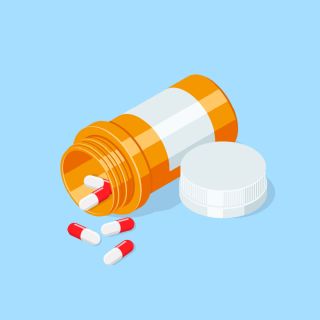Dementia
How Some Common Drugs Can Increase the Risk of Dementia
Anticholinergic drugs, including OTC meds, bear "robust" risk.
Posted April 21, 2023 Reviewed by Tyler Woods
Key points
- I had no idea my mother's prescription of common drugs could risk her cognition later. Nor did she.
- Calculated as a score based on medications, her ACB was much higher than recommended. Did her doctor know the risks?
- Acetylcholine is imperative in the conversion of short-term memories to long-term ones.
My mother’s ACB score is displayed in big, bold, fire-engine red letters beneath the list of prescription drugs I have input to calculate it.

ACB stands for Anticholinergic Cognitive Burden. I only thought to explore anticholinergic drugs, what they are, their effects, and which ones my mother may be—and may have been—on, when a doctor remarked on the dementia risk of sleeping tablets: “Many sleep aids are anticholinergic,” he told me, “that means they disrupt a neurotransmitter in our brain called acetylcholine, which is essential for memory.”
The drugs that bear this AC burden and are responsible for stacking up that score (and not in a good way), in my mother’s case, include an anti-anxiety, an antidepressant, and an antacid. It’s easy to remember which drugs affect acetylcholine because they begin with “ant” or “anti”: antihistamines, anti-anxiety, antidepressant, antacid. These drugs do not need to be taken for long before an effect manifests: one study found that drugs with strong anticholinergic effects—effects thought to be cumulative—had the potential to cause cognitive impairment when taken continuously for as few as 60 days.
Anticholinergic drugs—and they don’t all need to be prescribed by a doctor, some are OTC meds—block possibly one of the most important neurotransmitters. Acetylcholine has been called the “memory molecule” for the crucial role it plays in recall, learning, and focus. It was one of the first neurotransmitters identified—about a century ago—and is one of the most abundant in our nervous system.
A typical early sign of insufficient amounts might manifest as “senior moments.” (I squirm with recognition as I remember that’s what I called my mother’s earliest memory lapses). Another early symptom is the loss of spatial awareness (and I remember puzzling when my mother asked, ‘Now, where’s the bathroom again?’ How did she not know, I wondered?)
Acetylcholine is imperative in the conversion of short-term memories to long-term ones. Think of it as the program essential to transfer data to a careful archive. My mother’s archive is empty; what files remain are falling apart and dusty. Most are missing: there are huge gaps in her cerebral annals.
Acetylcholine is not just important because it helps us to learn, concentrate, and stay mentally engaged, it also helps modulate REM sleep, emotion, and even thirst. Again I am struck: my mother has, for as long as I can remember, been appalling at reaching for a glass of water. She seemed not to register thirst, never needed to slake it in the greedy way I must. And now, in the late stages of Alzheimer's Disease, almost not at all. Is this why?
Acetylcholine also enhances brain plasticity, which supports our mental muscles. I think of my mother’s thighs, thin now and withered. She cannot rise from a chair unaided. She cannot walk without support. I am witness to this wastage. It is obvious, on show.
We cannot see the atrophy in our brains. We don’t notice until it’s too late.
A study published in the BMJ suggests "a robust association between some classes of anticholinergic drugs and future dementia incidence," a result observed from exposure 15 to 20 years before a diagnosis. Did my mother's physician not know this when he added a drug to manage urinary incontinence to her antidepressant, anti-anxiety prescriptions? She certainly didn't.
Acetylcholine levels decline as we age. It’s in these advanced years that physicians may see fit to prescribe drugs to boost mood or aid sleep or alleviate incontinence, oxybutynin, say, which scores a maximum 3 on the ACB scale (the medication my mother was prescribed a decade ago). Or something for sluggish digestion, ranitidine, perhaps, (with a burden of 2). These conspire to damp down that all-important, ever-depleted memory molecule even more.
Of course, these drugs have a place. But perhaps they don’t all have a place at the same time. Perhaps there are safer alternatives? Doctors need to be mindful of the risks they pose, especially to an already at-risk population: the over 65's. Patients do, too. Everybody does. Know your ACBs!
According to the Anticholinergic Burden Calculator—which harnesses two different scoring systems, the German Anticholinergic Burden score and the Anticholinergic Cognitive Burden Scale as the most reliable—a score of three or more is associated with increased cognitive impairment and mortality. A study cited by the U.K.’s NHS found that 20 percent of patients over 65 who scored four or more had died by the end of the two-year study, compared with 7 percent of patients with a score of zero.
My mother’s ACB, based on current and previous prescriptions, stands at a whopping seven.
She has borne the burden of this for 45 years.




